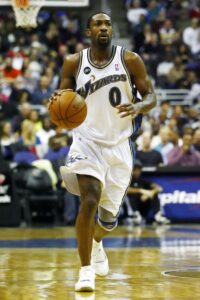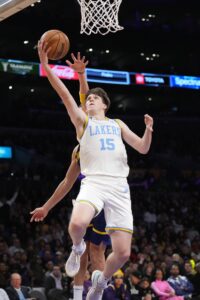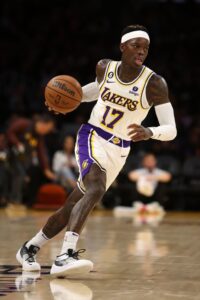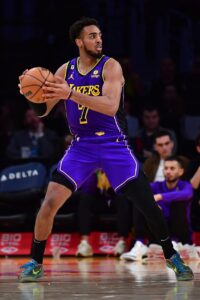Gilbert Arenas hasn’t played in the NBA since 2012, but his legacy lives on in the NBA’s Collective Bargaining Agreement.
 The NBA introduced the Gilbert Arenas provision in the 2005 CBA as a way to help teams retain their restricted free agents who aren’t coming off standard rookie scale contracts. While Arenas isn’t specifically named in the CBA, the rule colloquially known as the Arenas provision stems from his own restricted free agency in 2003.
The NBA introduced the Gilbert Arenas provision in the 2005 CBA as a way to help teams retain their restricted free agents who aren’t coming off standard rookie scale contracts. While Arenas isn’t specifically named in the CBA, the rule colloquially known as the Arenas provision stems from his own restricted free agency in 2003.
At the time, the Warriors only had Early Bird rights on Arenas, who signed an offer sheet with the Wizards starting at about $8.5MM. Because Golden State didn’t have $8.5MM in cap room and could only offer Arenas a first-year salary of about $4.9MM using the Early Bird exception, the Warriors were unable to match the offer sheet and lost Arenas to Washington.
Introduced to help avoid similar instances of teams losing promising young free agents, the Arenas provision limits the first-year salary that rival suitors can offer restricted free agents who have only been in the league for one or two years.
The starting salary for an offer sheet can’t exceed the amount of the non-taxpayer mid-level exception, which allows the player’s original team to use either the mid-level exception or the Early Bird exception to match it. Otherwise, a team without the necessary cap space would be powerless to keep its player, like the Warriors were with Arenas.
An offer sheet from another team can still have an average annual salary that exceeds the non-taxpayer’s mid-level, however. The annual raises are limited to 5% between years one and two and 4.5% between years three and four, but a team can include a significant raise between the second and third years of the offer.
As long as the first two years of a team’s offer sheet are for the highest salary possible, the offer is fully guaranteed, and there are no incentives included, the third-year salary of the offer sheet can be worth up to what the player’s third-year maximum salary would have been if not for the Arenas restrictions.
Based on a projected $136,021,000 salary cap for 2023/24, here’s the maximum offer sheet a first- or second-year RFA could receive this coming summer:
| Year |
Salary |
Comment
|
| 2023/24 |
$12,405,000 |
Value of non-taxpayer’s mid-level exception. |
| 2024/25 |
$13,025,250 |
5% raise on first-year salary. |
| 2025/26 |
$37,405,638 |
Maximum third-year salary for a player with 1-2 years in NBA. |
| 2026/27 |
$39,088,892 |
4.5% raise on third-year salary. |
| Total |
$101,924,780 |
Average annual salary of $25,481,195. |
It’s important to note that in order to make the sort of offer outlined above, a team must have enough cap room to accommodate the average annual value of the contract. Because if the offer sheet isn’t matched, the player’s new club will spread the cap hits equally across all four years (ie. $25.48MM per season).
In other words, a team with $26MM in cap space could extend this offer sheet to a first- or second-year RFA. But a team with only $20MM in cap space would have to reduce the third- and fourth-year salaries in its offer sheet to get the overall average salary of the offer down to $20MM per year, despite being able to comfortably accommodate the first-year salary.
The application of the Arenas provision is infrequent, since first- and second-year players who reach free agency rarely warrant such lucrative contract offers. First-round picks sign four-year rookie deals when they enter the NBA, so the Arenas provision generally applies to second-round picks or undrafted free agents whose first NBA contracts were only for one or two years.
The Arenas provision hasn’t been used at all in recent years. Based on our data, it was last relevant during the 2016 offseason, when multiple teams made use of the Arenas provision as they attempted to pry restricted free agents from rival teams.
One notable example from that summer was Tyler Johnson‘s restricted free agency with Miami. The Heat had Early Bird rights on Johnson, who had only been in the NBA for two seasons. The Nets attempted to pry him away with an aggressive offer sheet that featured salaries of $5,628,000, $5,881,260, $19,245,370, and $19,245,370. It wasn’t the maximum that Brooklyn could have offered Johnson, but the massive third-year raise was a tough pill for Miami to swallow.
Overall, the deal was worth $50MM for four years. If the Heat had declined to match it, the Nets would have flattened out those annual cap hits to $12.5MM per year, the average annual value of the deal. However, due to the Arenas provision, Miami was able to match Brooklyn’s offer sheet with the Early Bird exception, even though the Heat wouldn’t have been able to directly offer Johnson a four-year, $50MM contract using the Early Bird exception.
When a team matches an Arenas-provision offer sheet, it also has the option of flattening those cap charges. However, that option is only available if the team has the cap room necessary to accommodate the average annual value of the deal. Otherwise, the club has to keep the unbalanced cap charges on its books. In the case of Johnson, the Heat didn’t have enough cap room to spread out the cap hits, so they were forced to carry those exorbitant cap charges in years three and four.
When Johnson’s cap hit for the Heat jumped from $5,881,260 to $19,245,370 in 2018/19, it became an albatross — the team eventually sent him to Phoenix in a salary-dump deal at the 2019 deadline.
 This coming offseason, the best candidate for an Arenas-provision offer sheet is Lakers guard Austin Reaves, who has emerged as an important rotation player for the club during its push for a playoff spot.
This coming offseason, the best candidate for an Arenas-provision offer sheet is Lakers guard Austin Reaves, who has emerged as an important rotation player for the club during its push for a playoff spot.
If the Lakers negotiate with Reaves directly, they’d be limited to offering him a little over $50MM on a four-year deal using the Early Bird exception. However, a rival team with the necessary cap room could offer him up to nearly $102MM, as detailed above.
A four-year, $102MM deal seems awfully ambitious for Reaves, but it’s possible that a rival suitor could test the Lakers’ limits by using the Arenas provision to put an offer sheet of $60MM or more on the table for the young guard. If Los Angeles matched such an offer, the contract would look the same in the first two years as the one L.A. could offer, but would include larger salaries in years three and four.
Bulls guard Ayo Dosunmu, Raptors guard Dalano Banton, and Heat center Omer Yurtseven are among the other players who will become eligible for restricted free agency this offseason with just two years of NBA experience under their belts and would be subject to the Arenas provision.
Finally, just because a club is given the opportunity to use the Arenas provision to keep its restricted free agent doesn’t mean that club will necessarily have the means. Here are a few situations in which the Arenas provision would not help a team keep its restricted free agent:
- If a team only has the taxpayer mid-level exception or room exception available, it would be unable to match an offer sheet for a Non-Bird free agent if the starting salary exceeds the taxpayer mid-level, room exception, and/or Non-Bird exception amount.
- A team would be unable to match an offer sheet exceeding the Non-Bird exception for a Non-Bird free agent if that team has used its mid-level exception on another player. The club could use Early Bird rights to match if those rights are available, however.
- If the player is a Non-Bird or Early Bird free agent with three years of NBA experience, the Arenas provision would not apply — only players with one or two years in the league are eligible.
- If the player is eligible for restricted free agency but doesn’t receive a qualifying offer, the Arenas provision would not apply.
Note: This is a Hoops Rumors Glossary entry. Our glossary posts will explain specific rules relating to trades, free agency, or other aspects of the NBA’s Collective Bargaining Agreement. Larry Coon’s Salary Cap FAQ was used in the creation of this post.
Earlier versions of this post were published in past years by Luke Adams and Chuck Myron.
 Before the 2022/23 season started, Schröder said he had “
Before the 2022/23 season started, Schröder said he had “ There’s nothing about Brown’s game that really jumps out at you, nor do his modest numbers — he’s averaging 7.3 PPG, 4.1 RPG and 1.2 APG in 70 games (45 starts, 24.9 MPG).
There’s nothing about Brown’s game that really jumps out at you, nor do his modest numbers — he’s averaging 7.3 PPG, 4.1 RPG and 1.2 APG in 70 games (45 starts, 24.9 MPG). The NBA introduced the Gilbert Arenas provision in the 2005 CBA as a way to help teams retain their restricted free agents who aren’t coming off standard rookie scale contracts. While Arenas isn’t specifically named in the CBA, the rule colloquially known as the Arenas provision stems from his own restricted free agency in 2003.
The NBA introduced the Gilbert Arenas provision in the 2005 CBA as a way to help teams retain their restricted free agents who aren’t coming off standard rookie scale contracts. While Arenas isn’t specifically named in the CBA, the rule colloquially known as the Arenas provision stems from his own restricted free agency in 2003. This coming offseason, the best candidate for an Arenas-provision offer sheet is Lakers guard
This coming offseason, the best candidate for an Arenas-provision offer sheet is Lakers guard